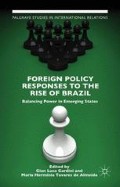Abstract
Brazil has risen. Its economy is the seventh largest in the world in terms of gross domestic product (GDP) (World Bank, 2015). Its military spending is the highest in Latin America, although Brazil does not have nuclear capability. Brazil’s international activism in the last ten years has been remarkable, with the direct launch of, or active participation in, integration initiatives regionally (Integration of the Regional Infrastructure of South America (IIRSA), Union of South American Nations (UNASUR), Community of Latin American and Caribbean States (CELAC)) and with an acknowledged growing role internationally (World Trade Organization (WTO), climate change negotiations, leading the UN mission in Haiti). However, the rising trajectory of Brazil, at the time of publishing, seems to have come to a halt.
Access this chapter
Tax calculation will be finalised at checkout
Purchases are for personal use only
Preview
Unable to display preview. Download preview PDF.
References
Allison, Graham T. (1971) Essence of Decision: Explaining the Cuban Missile Crisis, Boston, MA: Little & Brown.
Allison, Graham T. and Philip Zelikow (1999) Essence of Decision: Explaining the Cuban Missile Crisis, New York: Longman.
Lafer, Celso (2000) ‘Brazilian International Identity and Foreign Policy: Past, Present, and Future’, Daedalus (spring), 129(2), 207–238.
Lima, Mario Sergio and Arnaldo Galvao (2015) ‘Brazil Signals Worst Recession in 25 Years Won’t Stop Rate Boost’, Bloomberg Business, 4 June. http://www.bloomberg.com/news/articles/2015–06-04/brazil-signals-worst-recession-in-25-years-won-t-stop-rate-boost, date accessed 27 July /2015.
Paul, Thazha V. (2005) ‘Soft Balancing in the Age of U.S. Primacy’, International Security 30(1), 46–71.
Smith, Steve (1980) ‘Allison and the Cuban Missile Crisis: A Review of the Bureaucratic Politics Model of Foreign Policy Decision-Making’, Millennium 9(1), 21–40.
World Bank (2015) ‘GDP Ranking’, http://data.worldbank.org/data-catalog/GDP-ranking-table, date accessed 24 July 2015.
Editor information
Editors and Affiliations
Copyright information
© 2016 Gian Luca Gardini and Maria Hermínia Tavares de Almeida
About this chapter
Cite this chapter
Gardini, G.L., de Almeida, M.H.T. (2016). Concluding Remarks. In: Gardini, G.L., de Almeida, M.H.T. (eds) Foreign Policy Responses to the Rise of Brazil. Palgrave Studies in International Relations Series. Palgrave Macmillan, London. https://doi.org/10.1007/978-1-137-51669-5_15
Download citation
DOI: https://doi.org/10.1007/978-1-137-51669-5_15
Publisher Name: Palgrave Macmillan, London
Print ISBN: 978-1-349-70374-6
Online ISBN: 978-1-137-51669-5
eBook Packages: Political Science and International StudiesPolitical Science and International Studies (R0)

